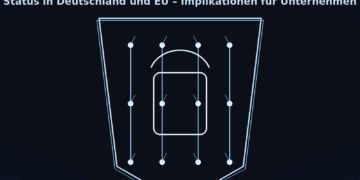The integration of blockchain technology and smart contracts in supply chains promises increased transparency, efficiency and security. This opens up fascinating opportunities for logistics start-ups to optimize processes and develop innovative business models. However, the implementation of these technologies also entails complex legal challenges. As a lawyer with many years of experience as an entrepreneur in the tech sector, I understand the special features of this technology and can help you to develop legally compliant strategies for your blockchain-based logistics solutions.
Key aspects of the legally compliant implementation of smart contracts in the supply chain
1. legal classification of smart contracts
The legal nature of smart contracts is complex:
– Analysis of the legal validity and enforceability of smart contracts
– Integration of smart contracts into existing contractual frameworks
– Dealing with the immutability of blockchain entries in the context of contractual flexibility
My expertise helps you to design smart contracts in such a way that they are both legally binding and practical to implement.
2. data protection and data security
Blockchain technology raises specific data protection issues:
– Implementation of data protection by design in blockchain solutions
– Dealing with the immutability of blockchain data in the context of the right to be forgotten
– Development of concepts for the GDPR-compliant storage of sensitive supply chain data
As an experienced IT entrepreneur, I can help you to develop data protection-compliant blockchain solutions that strengthen the trust of all parties involved.
3. liability and responsibilities
The decentralized nature of blockchain networks requires clear liability regulations:
– Definition of responsibilities in decentralized networks
– Liability regulations for errors in smart contracts or blockchain implementations
– Dealing with liability issues in automated processes and decisions
I support you in developing clear and fair liability structures that protect your startup and are also acceptable to your partners.
4. interoperability and standards
Interoperability is crucial for the success of blockchain in the supply chain:
– Legal aspects of integrating different blockchain systems
– Development and implementation of industry standards for blockchain in logistics
– Drafting contracts for cooperation in blockchain consortia
My experience helps you to develop legally compliant solutions for the integration and standardization of your blockchain applications.
Special challenges and solutions
1. cross-border transactions
Blockchain-based supply chains are often international:
– Consideration of different legal frameworks in different jurisdictions
– Development of solutions for international dispute resolution for smart contracts
– Dealing with different regulatory requirements for blockchain technology
My international experience helps you to develop legally compliant solutions for global blockchain supply chains.
2. tokenization of assets
Tokenization in the supply chain offers new opportunities:
– Legal classification of tokenized assets and goods
– Development of compliance strategies for trading in tokenized goods
– Tax law aspects of tokenization in the supply chain
I support you in the development of legally compliant tokenization concepts for your logistics solutions.
3. governance in blockchain networks
The governance of decentralized systems requires innovative approaches:
– Development of governance structures for blockchain consortia in logistics
– Legal aspects of consensus mechanisms and decision-making in decentralized networks
– Dealing with changes and upgrades in blockchain systems
My holistic approach helps you to develop robust governance structures for your blockchain initiatives.
4. integration with IoT and AI
The combination of blockchain with IoT and AI opens up new opportunities:
– Legal aspects of linking IoT data with blockchain systems
– Liability issues in automated decisions by AI in blockchain supply chains
– Data protection challenges in the processing of IoT data in blockchain networks
I help you to develop integrated solutions that utilize the advantages of different technologies in a legally compliant manner.
Practical tips for logistics start-ups
1. proof of concept: Start with a limited proof of concept to identify legal and technical challenges.
2. stakeholder involvement: Involve all relevant stakeholders at an early stage to ensure acceptance and compliance.
3. legal due diligence: Conduct a thorough legal review of your blockchain solution before implementing it.
4. flexible contract design: develop flexible contract structures that take into account both smart contracts and traditional contracts
5. continuous training: Keep yourself and your team up to date with legal developments in the blockchain sector.
As a lawyer with extensive experience as an entrepreneur in the tech sector, I offer you a unique perspective on the legally compliant implementation of blockchain and smart contracts in logistics. I understand not only the legal intricacies, but also the technological possibilities and business implications of your blockchain strategy.
My goal is to develop legal solutions that protect your logistics startup, promote innovation and strengthen the trust of your partners and customers. By combining my legal expertise with practical business experience, I can help you use blockchain as a strategic advantage for your company without taking legal risks.
Let’s work together to develop strategies that optimally position your logistics startup for the future of blockchain-based supply chains. My holistic approach ensures that we consider and harmonize all aspects – from legal requirements to technical innovations and business models.












































